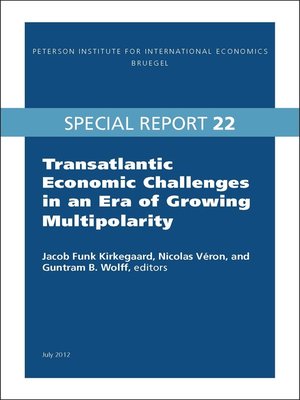Transatlantic Economic Challenges in an Era of Growing Multipolarity
ebook ∣ Special Report 22
By Jacob Funk Kirkegaard

Sign up to save your library
With an OverDrive account, you can save your favorite libraries for at-a-glance information about availability. Find out more about OverDrive accounts.
Find this title in Libby, the library reading app by OverDrive.



Search for a digital library with this title
Title found at these libraries:
| Library Name | Distance |
|---|---|
| Loading... |
Shifts in global economic dominance are by nature tectonic and never precipitated by single events. The Great Recession of 2008–09, however, has presented the European Union, its common currency the euro, and the United States with new global challenges. The transatlantic partnership has dominated the world economy since the early 20th century and, based upon US and European values and interests, has designed and sustained all its principal global political and economic institutions.
But countries outside the European Union and United States now account for about half of the world economy, and in the aftermath of the Great Recession their share is growing rapidly. Hence their increasing role and concomitant demands for greater influence over global economic governance pose a series of challenges and opportunities to the European Union and the United States, as illustrated by the eclipse of the G-8 by the G-20.
The contributions in this volume by subject area experts from the Peterson Institute for International Economics and Bruegel ponder how or whether the rise of outside actors of potentially equal, or even greater, economic weight will invariably force a rethinking of not only how the European Union and the United States should conduct policy externally towards the new rising economic poles, but also of the substantive contents of the EU-US bilateral economic and political relationship.







